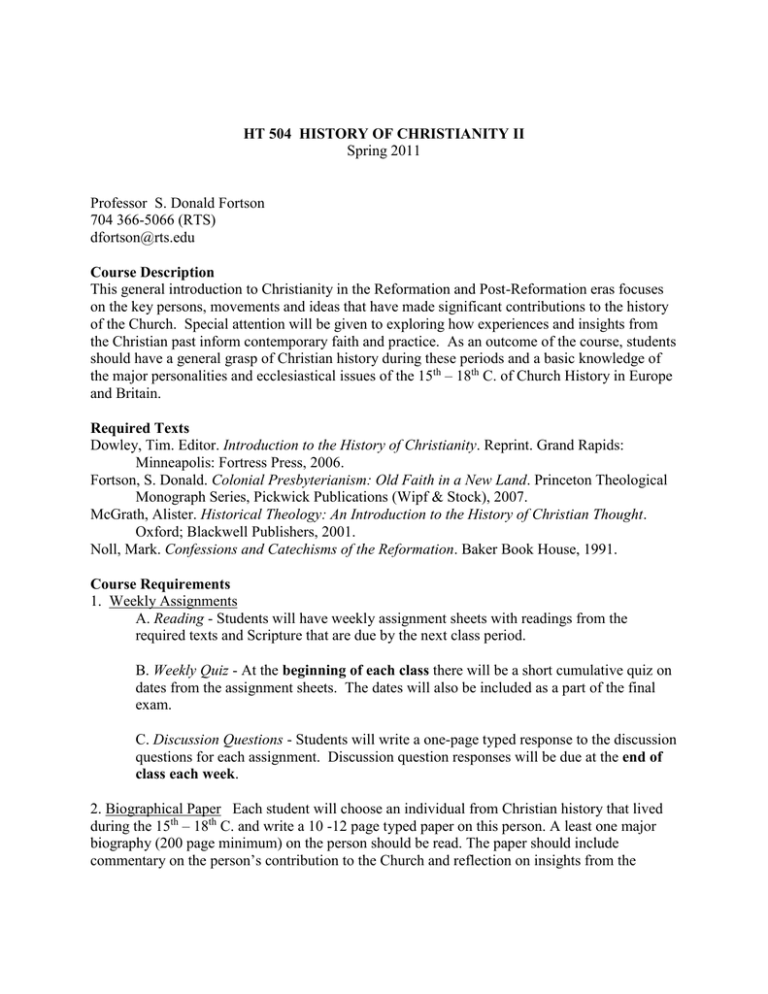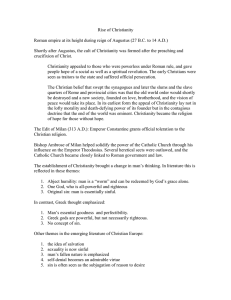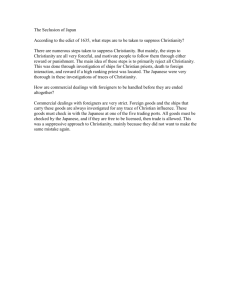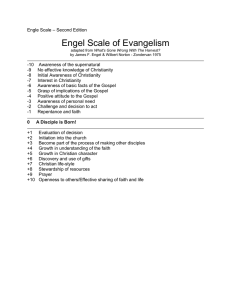HT 504 HISTORY OF CHRISTIANITY II Course Description Spring 2011
advertisement

HT 504 HISTORY OF CHRISTIANITY II Spring 2011 Professor S. Donald Fortson 704 366-5066 (RTS) dfortson@rts.edu Course Description This general introduction to Christianity in the Reformation and Post-Reformation eras focuses on the key persons, movements and ideas that have made significant contributions to the history of the Church. Special attention will be given to exploring how experiences and insights from the Christian past inform contemporary faith and practice. As an outcome of the course, students should have a general grasp of Christian history during these periods and a basic knowledge of the major personalities and ecclesiastical issues of the 15th – 18th C. of Church History in Europe and Britain. Required Texts Dowley, Tim. Editor. Introduction to the History of Christianity. Reprint. Grand Rapids: Minneapolis: Fortress Press, 2006. Fortson, S. Donald. Colonial Presbyterianism: Old Faith in a New Land. Princeton Theological Monograph Series, Pickwick Publications (Wipf & Stock), 2007. McGrath, Alister. Historical Theology: An Introduction to the History of Christian Thought. Oxford; Blackwell Publishers, 2001. Noll, Mark. Confessions and Catechisms of the Reformation. Baker Book House, 1991. Course Requirements 1. Weekly Assignments A. Reading - Students will have weekly assignment sheets with readings from the required texts and Scripture that are due by the next class period. B. Weekly Quiz - At the beginning of each class there will be a short cumulative quiz on dates from the assignment sheets. The dates will also be included as a part of the final exam. C. Discussion Questions - Students will write a one-page typed response to the discussion questions for each assignment. Discussion question responses will be due at the end of class each week. 2. Biographical Paper Each student will choose an individual from Christian history that lived during the 15th – 18th C. and write a 10 -12 page typed paper on this person. A least one major biography (200 page minimum) on the person should be read. The paper should include commentary on the person’s contribution to the Church and reflection on insights from the person’s life that might be useful today. A list of sources should be attached. The paper is due the last day of class. 3. Final Exam The final examination will include essay questions from the required reading and lectures. There will also be short-answer sections on important dates, people and ideas. The final may be taken anytime during the exam periods on campus. 4. Reading Report – This report will indicate the amount of Required Reading that has been completed during the semester. The Reading Report is due the last day of the exams. Grading Weekly Quizes and Discussion Questions - 25% Biographical Paper - 25% Reading Report - 25% Final Exam - 25% MDiv* Student Learning Outcomes In order to measure the success of the MDiv curriculum, RTS has defined the following as the intended outcomes of the student learning process. Each course contributes to these overall outcomes. This rubric shows the contribution of this course to the MDiv outcomes. *As the MDiv is the core degree at RTS, the MDiv rubric will be used in this syllabus. Broadly understands and articulates knowledge, both oral Articulation and written, of essential biblical, theological, historical, and (oral & written) cultural/global information, including details, concepts, and frameworks. Scripture Significant knowledge of the original meaning of Scripture. Also, the concepts for and skill to research further into the original meaning of Scripture and to apply Scripture to a variety of modern circumstances. (Includes appropriate use of original languages and hermeneutics; and integrates theological, historical, and cultural/global perspectives.) Reformed Theology Significant knowledge of Reformed theology and practice, with emphasis on the Westminster Standards. Sanctification Desire for Worldview Demonstrates a love for the Triune God that aids the student’s sanctification. Rubric Strong Moderate Minimal None Strong Minimal Strong Strong Burning desire to conform all of life to the Word of God. Minimal Winsomely Reformed Preach Worship Shepherd Embraces a winsomely Reformed ethos. (Includes an appropriate ecumenical spirit with other Christians, especially Evangelicals; a concern to present the Gospel in a God-honoring manner to non-Christians; and a truth-in-love attitude in disagreements.) Ability to preach and teach the meaning of Scripture to both heart and mind with clarity and enthusiasm. Knowledgeable of historic and modern Christian-worship forms; and ability to construct and skill to lead a worship service. Ability to shepherd the local congregation: aiding in spiritual maturity; promoting use of gifts and callings; and encouraging a concern for non-Christians, both in America and worldwide. Strong Minimal Moderate Moderate Mini-Justification 1. Memorization of dates 2. Development of doctrine 3. Biographical studies 1. Discuss church’s interpretation of Bible throughout course 2. Differences among Reformers 3. Sola Scriptura in Reformation 1. Calvin and Geneva 2. Reformed tradition in France, Netherlands, England 3. Presbyterians in colonial America 1. Calvin’s view of Chr. Life 2. Spener and Pietism 3. Zinzendorf and Wesley 4. English Puritan piety 1. Niebuhr’s Christ and Culture 2. Views of Reformers 1. Diff. Branches of Reformation 2. R.C. Reform 3. Emergence of Evangelicalism 4. Great Awakening ecumenism 1. Calvin as a preacher 2. G. Whitefield’s preaching 1. Liturgy in Lutheran, Reformed, Anabaptist and Anglican Traditions 1. Reformation ecclesiology 2. RC and Moravian missions 3. Preaching in Great Awakening Course Units Unit I Understanding the Protestant Reformation Unit II Luther’s Reform of the Church Unit III Zwingli and the Anabaptists Unit IV Calvin and the Reformed Tradition Unity V Reformation in England and Scotland Unit VI Roman Catholic Reform Unit VII English Puritans and Separatists Unit VIII Pietists and Methodists Unit IX The Enlightenment Unit X Christianity in the New World Unit XI Colonial Presbyterians History of Christianity II Assignment 1 – February 9 Reading: 1. Introduction to Hist. of Christianity, pp. 352-365. 2. Confessions and Catechisms of the Reformation, pp. 25-36. 3. Historical Theology, pp. 101-113, 116-123, 146-155. Dates to Remember: 1418 Thomas a Kempis writes Imitation of Christ 1453 Fall of Constantinople 1456 Guttenburg’s printed Bible 1512 Michelangelo, Sistine Chapel frescoes 1516 Erasmus’ Greek New Testament Discussion Questions: 1. Should Christians be involved in the Arts? What challenges do Christians face in this arena? 2. How do you respond to this statement: “All truth is God’s truth”? What are the implications of this idea? History of Christianity II Assignment 2 – February 16 Reading: 1. Introduction to Hist. of Christianity, pp. 366-377, 384-386. 2. Confessions and Catechisms of the Reformation, pp. 59-80, 81-121. 3. Historical Theology, pp. 156-160, 177-190. 4. Eph. 2:8-9 Romans 1:17; 3:24,28; 5:1 2 Tim. 3:16 1 Tim. 2:1-6 Heb. 10:19-22. Dates to Remember: 1517 Martin Luther posts 95 Theses 1521 Diet of Worms 1530 Augsburg Confession 1555 Peace of Augsburg 1577 Formula of Concord Discussion Questions: 1. How would you explain to a Roman Catholic friend Luther’s understanding of justification by faith alone? What is the role of “good works?” 2. What is the meaning of the phrase, “priesthood of believers?” Is every Christian his or her own priest? History of Christianity II Assignment 3 – February 23 Reading: 1. Introduction to Hist. of Christianity, pp. 378-379, 401-405. 2. Confessions and Catechisms of the Reformation, pp. 37-58. 3. Col. 2:11-12 1 Cor. 1:16 ; 7:14; 11:23-29 Acts 16:31-33; 18:8 John 14:26; 16:8-15 Dates to Remember: 1518 Ulrich Zwingli comes to Zurich 1525 Anabaptist movement begins 1529 Marburg Colloquy 1536 Memo Simons baptized as Anabaptist Discussion Questions: 1. What part of the Anabaptist vision are you attracted to? Why? 2. With so many Protestant differences over the sacraments, how can we demonstrate unity in Christ? History of Christianity II Assignment 4 – March 1 Reading: 1. Introduction to History of Christianity, pp.378-383. 2. Confessions and Catechisms of the Reformation pp. 123-164. 3. Historical Theology, pp.168-172, 199, 205-213. 4. Acts 4:28; 13:48 Rom. 8:29 Eph. 1:4; 2:1-10 Dates to Remember: 1536 First edition, John Calvin’s Institutes of the Christian Religion 1563 Heidelberg Catechism 1572 St. Bartholomew’s Day Massacre 1598 Edict of Nantes 1618 Synod of Dordt Discussion Questions: 1. Is the doctrine of predestination a comforting or disturbing doctrine to you? Why? 2. Do you consider church discipline a mark of the true church? Explain your answer. History of Christianity II Assignment 5 – March 8 Reading: 1. Introduction to History of Christianity, pp. 386-400. 2. Confessions and Catechisms of the Reformation, pp. 211-227. 3. 1 Pet. 1:1-9; 3:13-18; 4:12-19 Dates to Remember: 1534 Act of Supremacy, Henry VIII 1549 Thomas Cranmer’s Book of Common Prayer 1559 John Knox returns to Scotland 1563 Thirty-Nine Articles Discussion Questions: 1. Is a Prayer Book helpful for Christian worship today? Why or why not? 2. What are the advantages/disadvantages of a state Protestant Church? History of Christianity II Assignment 6 – March 22 Reading: 1. Introduction to History of Christianity, pp. 410-434. 2. Confessions and Catechisms of the Reformation, pp. 165-210. 3. Historical Theology, pp. 163, 172-174, 183-184, 190-197, 239-240, 312-319. 4. Romans 12 Dates to Remember: 1540 Ignatius Loyola and Jesuits 1545 Council of Trent convenes 1549 Francis Xavier’s mission to Japan Discussion Questions: 1. What is your evaluation of the Roman Catholic Counter-Reformation and what do you think we can learn from it? 2. What is your perspective on Evangelical / Catholic dialogue and cooperation on social issues? History of Christianity II Assignment 7 – March 29 Reading: 1. Introduction to History of Christianity, pp. 388-389, 392-393, 406-409. 2. Historical Theology, pp. 174-175. 3. John 4:20-24 Phil. 3:2,3 Col. 3:12-17 Dates to Remember: 1609 John Smyth baptizes the first English Baptists 1611 King James Bible 1643 Westminster Assembly begins 1678 John Bunyan writes Pilgrim’s Progress 1793 William Carey sails for India Discussion Questions: 1. How important is it for Christian worship to conform to the norms of Scripture? 2. In what areas do evangelical churches need to be “purified” today? History of Christianity II Assignment 8 – April 5 Reading: 1. Introduction to Hist. of Christianity, pp. 444-461, 475-484 2. Historical Theology, pp. 175-176. 3. Matt. 28:19,20 Rom. 12:1 Eph. 1:4 1 Pet. 1:15,16 Dates to Remember: 1675 Jacob Spener writes Pia Desideria 1707 Isaac Watts publishes Hymns and Spiritual Songs 1732 First Moravian missionaries 1738 John and Charles Wesley’s evangelical conversions 1771 Francis Asbury comes to America Discussion Questions: 1. Has Christianity in America lost its holiness? What’s wrong? 2. How important is evangelism and world missions for the life of the church? Explain. History of Christianity II Assignment 9 – April 12 Reading: 1. Introduction to History of Christianity, pp.485-517. 2. Historical Theology, pp. 214-229, 270-273, 297-298, 305-306. 3. 1 Tim. 1:5-11 2 Tim. 3:16,17 2 Tim. 4:1-4 Dates to Remember: 1781 Kant publishes Critique of Pure Reason 1789 French Revolution begins 1799 Friederich Schleiermacher’s Lectures on Religion Discussion Questions: 1. How would you answer a non-Christian who asked you why you believe the Bible is unique compared to any other religious book? 2. How has the Enlightenment had an impact on Christianity? History of Christianity II Assignment 10 – April 19 Reading: 1. Introduction to History of Christianity, pp.436-444. 2. Colonial Presbyterianism, pp. 1-112. Dates to Remember: 1620 Mayflower Compact 1636 Harvard College founded 1649 Cambridge Platform 1682 Francis Makemie comes to America Discussion Questions: 1. How realistic was the Puritan vision for the New World? 2. Should American believers emphasize the Christian heritage of our forefathers? Why or why not? History of Christianity II Assignment 11 – April 26 Reading: Colonial Presbyterianism, pp. 113-218. Dates to Remember: 1706 First Presbytery meets in Philadelphia 1729 Adopting Act 1740 Great Awakening peaks 1789 1st Presbyterian General Assembly Discussion Questions: 1. Is ecclesiastical compromise a necessity for the peace of the church? Why or why not? 2. If the U.S. experienced another “awakening” in the 21st C., what would it look like? RTS-Charlotte History of Christianity II Review for Final Exam A. Know all dates in all Assignments and review text pp. 352 – 517. B. Review the “blue blocks” – biographical sketches – matching questions on exam C. Be prepared to write a one-page essay on the following: 1. How did Luther understand the place of “tradition”? 2. What kinds of corruption were prevalent in the 16th C. Roman Catholic Church? 3. How did the Renaissance help pave the way for the Protestant Reformation? 4. Why is Erasmus important for any study of the 16th C.? 5. What topics did Luther address in the three treatises of 1520? 6. What happened at the Diet of Worms in 1521? 7. Describe the contributions of Philip Melancthon to the Lutheran reform. 8. Describe Zwingli’s ministry in Zurich. 9. What happened at the Marburg Colloquy? 10. Who were the Anabaptists and what did the Schleitheim Confession teach? 11. What were the contributions of Menno Simons to the Anabaptist movement? 12. How did Calvin reform the city of Geneva? 13. What was the historical setting of the St. Bartholomew’s Day Massacre? 14. What were the concerns of Jacob Arminius and how did the Synod of Dordt respond? 15. Describe the 1534 Act of Supremacy and the 1539 Six Articles Act. 16. What were Thomas Cranmer’s contributions to the English Reformation? 17. How was the Protestant cause furthered in England under Edward VI? 18. What was accomplished in the Elizabethan Settlement? 19. How did John Knox reform the church in Scotland? 20. What were some of the major decisions of the Council of Trent? 21. Discuss the goals of the Elizabethan Puritan movement? 22. What were Jacob Spener’s proposals for reforming the Lutheran Church? 23. What were the key emphases of John Wesley’s ministry? 24. How did the Enlightenment challenge Christianity? 25. What was the Puritan vision for the New World? 26. What happened in the Adopting Act of 1729? History of Christianity II Reading Report Please state the percentage of the Required Reading that you have completed. McGrath, Historical Theology ________% Dowley, Introduction to the History of Christianity ________% Fortson, Colonial Presbyterianism ________% Noll, Confessions and Catechisms of the Reformation ________% ___________________________________________ Name ________________________ Date BIBLIOGRAPHY – STANDARD WORKS Church History Surveys Bainton, Roland. Christendom: A Short History of Christianity and its Impact on Western Civilization. 2 Vols. New York: Harper and Row, 1966 Chadwick Henry, and Owen Chadwick, gen. eds. Oxford History of the Christian Church. Multi-volume set. NY: Oxford University Press, 1977. Dowley, Tim, ed. Eerdman's Handbook to the History of Christianity. Reprint. Grand Rapids: Eerdmans Publishing Co., 1978. Gonzalez, Justo L. The Story of Christianity. 2 vols. NY: Harper and Row, 1984. Latourette, Kenneth Scott. A History of Christianity. Revised ed. 2 Vols. NewYork: Harper and Row, 1975. __________ A History of the Expansion of Christianity. 7 vols. in 8. NY: Scribner, 18821910. Jedin, Hubert and John Dolan, eds. History of the Church. 10 vols. NY: Seabury,1979. Schaff, Philip. History of the Christian Church. 8 vols. Reprint. Grand Rapids: Eerdmans, 1949-50. Walker, Williston. A History of the Christian Church. 3rd ed. New York: Charles Scribner's Sons, 1970. History of Doctrine Berkhof, Louis. The History of Christian Doctrines. Grand Rapids: Baker Book House, Reprint 1976. Bettenson, Henry. Documents of the Christian Church. New York: Oxford University Press, 1967. Cunningham, William. Historical Theology. London: Banner of Truth Trust, 1960. H. Cunliffe-Jones. A History of Christian Doctrine. T&T Clark. Gonzalez, Justo. A History of Christian Thought. 3 Vols. reprint ed., Nashville: Abingdon Press, 1992. Harnack, Adolf. History of Dogma. 4 vols. Reprint. Gloucester, MA: Peter Smith, 1976. __________. Outlines of the History of Dogma. Boston: Beacon Press, 1957. Lane, Exploring Christian Thought. Nashville: Thomas Nelson Publishers, 1984 Lohse, Bernhard. A Short History of Christian Doctrine From the First Century to the Present. Trans. F. Ernest Stoeffler. Rev. Ed. Phil.: Fortress Press, 1985 McGrath, Alister. Historical Theology. Oxford: Blackwell Publisher, 2001 Pelikan, Jaroslav Jan. The Christian Tradition. 5 Vols. Chicago: University of Chicago Press, 1971-89. Seeberg, Reinhold. History of Doctrines. Reprint. Grand Rapids: Baker, 1977. Tillich, Paul. A History of Christian Thought. New York: Harper and Row, 1968. Bromiley, Geoffrey. Historical Theology An Introduction. Grand Rapids: William B. Eerdmans Publishing Company, 1978. Forell, George W. ed. Christian Social Teachings. Minneapolis: Augsburg Publishing House, 1971. Leith, John. Creeds of the Churches. Atlanta: John Knox Press, 1977. McGrath, Alister. ed. The Christian Theology Reader. Cambridge: Blackwell Publishers, 1995 Schaff, Philip. Creeds of Christendom. 3 Vols. reprint ed., Grand Rapids: Baker Book House, 1993. Encyclopedias , Handbooks and Dictionaries Beinert, Wolfgang and Francis Schussler Fiorenza. Handbook of Catholic Theology. New York : The crossroad Publishing Co., 1995 . Brauer, Jerald C. ed. The Westminster Dictionary of Church History. Philadelphia: Westminster, 1971.Church. Reprint. Oxford University Press, 1990. Cross, F.L. and E. A. Livingstone ed. The Oxford Dictionary of the Christian Church, Oxford Univ. Press. Douglas, J.D., ed. The New International Dictionary of Church History. Grand Rapids: Zondervan, 1978. Edwards, Paul, ed. The Encyclopedia of Philosophy. 8 vols. NY: Macmillan, 1967. Elwell, Walter. ed. Evangelical Dictionary of Theology. Grand Rapids: Baker, 1984. Ferguson, Sinclair B.; Wright, David F.; and Packer, J.I., ed. New Dictionary of Theology. Downers Grove, Illinois: Inter-Varsity Press, 1988. Harrison, Everett F., ed. Baker's Dictionary of Theology. Reprint., Grand Rapids: Baker Book House, 1981. Hart, Trevor. The Dictionary of Historical Theology. Grand Rapids: Eerdmans, 2000 Hastings, James, ed. Encyclopedia of Religion and Ethics. 12 vols. NY: Scribners, 190834. Reprint. Scribners, 1961 Jackson, Samuel M. ed.The New Schaff - Herzog Encyclopedia of Religion, 12 vols. New York: Funk and Wagnalls Co., 1908-1914 McClintock, J. and Strong, J., ed. Cyclopedia of Biblical Theological and Ecclesiastical Literature. 10 vols. New York: Harper & Bros., 1867-87. McDonald, William J., ed. The New Catholic Encyclopedia. 15 vols. NY: McGraw-Hill, 1967. Muller, Richard A. Dictionary of Latin and Greek Theological Terms. Grand Rapids: Baker Book House, 1985. Richardson, Alan and Bowen, John, eds. The Westminster Dictionary of Christian Theology. Philadelphia: Westminster, 1983.




